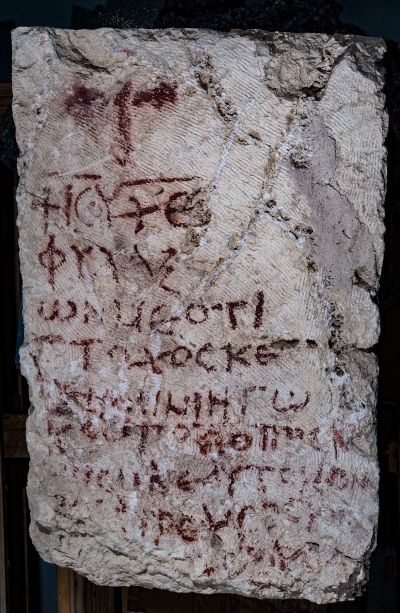Archaeologists discover 'very rare' ancient inscription paraphrasing Psalm 86

Archaeologists from the Hebrew University of Jerusalem recently reported that an ancient inscription paraphrasing the first two verses of Psalm 86 was uncovered from a remote site in the Judean desert of Israel.
According to a statement from the university, the four-week excavation project in the Hyrcania Fortress occurred in May, spearheaded by Oren Gutfeld and Michal Haber of the Hebrew University of Jerusalem in cooperation with Carson-Newman University and American Veterans Archaeological Recovery.
In the "pilot" season for the excavation, efforts were centered on two key areas of the fortress. In the southeast corner of the summit, a segment of a prominent upper fortification line was uncovered, dating to approximately the first or second century B.C. In the northeast corner, archeologists removed a deep layer of building stones that collapsed from the upper floor into an elongated basement hall.
A sizeable building stone lying on the plastered floor of the hall features lines of text painted in red with a cross at the top. The inscription was written in Koine Greek, the language the New Testament was written in.
The text was deciphered by epigraphist Dr. Avner Ecker of Bar-Ilan University, who says it is a paraphrase of Psalms 86: 1–2, also known as a "prayer of David."
"Jesus Christ, guard me, for I am poor and needy," the inscription reads.
The first two verses of Psalm 86 state, "Hear me, Lord, and answer me, for I am poor and needy. Guard my life, for I am faithful to you," according to the New International Version.
Ecker said that Psalm 86 "is one of the most common psalms in the Christian liturgy in ancient times."
"This psalm holds a special place in the Masoretic text as a designated prayer and is notably one of the most frequently recited psalms in Christian liturgy," Ecker said in a statement. "Thus, the monk drew a graffito of a cross onto the wall, accompanied by a prayer with which he was very familiar."
Gutfeld, a university teaching fellow, told The Washington Times that the discovery is the first time he can recall a phrase from the Psalms inscribed on a huge building stone.
"It's very, very rare — a unique something [that's] bigger than the inscription itself," Gutfeld added.
Ecker said that "syntax errors made in the transcription" indicate that the writer of the lines "did not speak Greek as his mother tongue, but was a native of the area, perhaps even a local, and spoke a Semitic language."
Researchers discovered another inscription at the site, but it has not yet been deciphered.
In the rubble of the excavation site, a small gold ring that appears to be child-like in size was uncovered. It has an oval turquoise stone engraved with Arabic Kufic script.
Another Arabic epigraphy expert was called to the scene to analyze the ring.
Nitzan Amitai-Preiss from the Hebrew University said a unique pattern in the script suggests the ring was also used as a seal.
"The script style is indicative of the early Islamic period, during the Umayyad and Abbasid Caliphates in the 7th and 8th centuries A.D.," Amitai-Preiss said in a statement shared by the university.
In a joint statement, Haber and Gutfeld warned that "our excavations will draw the attention of looters."
"The problem persists; it was here before us and will likely continue after us, underscoring the need for academic excavation — particularly in such a sensitive site as Hyrcania, though this is just one example. We are simply trying to stay a few steps ahead," researchers reported.
Nicole Alcindor is a reporter for The Christian Post.



























